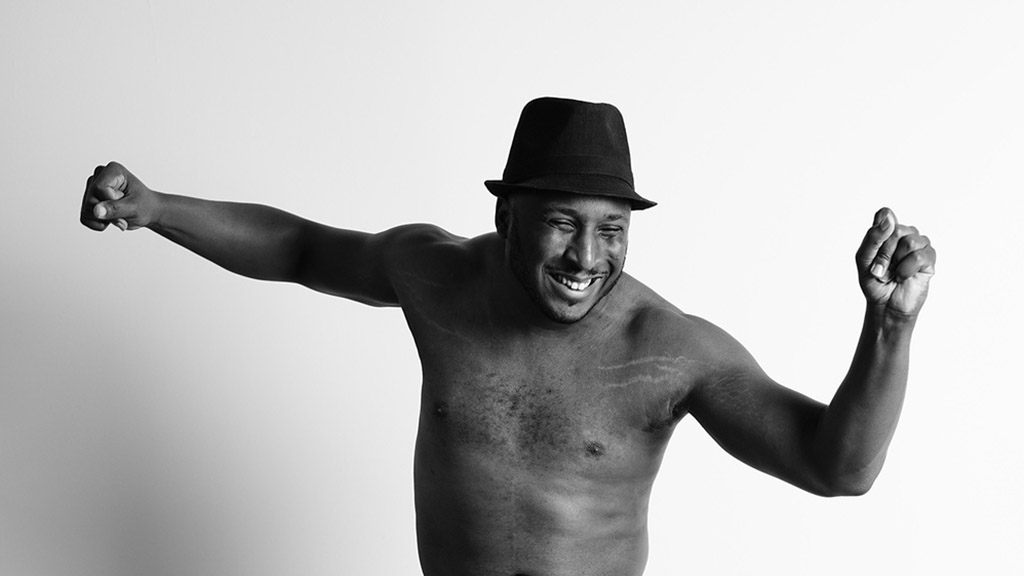
Bear Bellinger is a total babe. The Chicago-based actor was recently nominated for a Time Out Chicago Best Supporting Actor award for his work in Adding Machine: The Musical. He’s also a company member of The Fly Honey Show, a body-positive crew of performers currently taking Chicago by storm.
But beyond his on-stage achievements, Bear embodies all of the qualities that we use to define “babe” here at Babe Squad. He strives to be himself in the face of hardship, sees beyond what is to what could be, and passionately pursues his goals. He’s captivating, eloquent, and determined. He has fought hard to get where he is today, and he’s still fighting–for more than his own success, too. He’s using his chosen career path as a way to shine light on important social issues and create change in Chicago and beyond.
“For some reason, I’d say about 85% of the Ubers I get in, people start talking about politics,” Bear says as he lets outs a laugh from deep in his belly. “I never bring it on, but I mean…I’m not going to not engage in conversation with that person.” He is a tall, beautiful Black man with an amazing, thunderous laugh. It sorts of vibrates in your chest the same way heavy bass does during a live music performance. We’re sitting at Longman and Eagle in Chicago’s Logan Square, the neighborhood Bear calls home, on a Sunday afternoon. Perhaps not the best choice for an interview, considering the bustle and buzz of the environment, but Bear’s essence and chuckle overpower everything in the room.
Growing up in a poor neighborhood in Washington D.C., he paid his way through private prep school by singing in the choir at the Washington National Cathedral. He attended University of Wisconsin–Madison on a coin flip and studied theater because it was what challenged him the most. Having experienced racial injustice within his college program, he ventured to Chicago, determined to battle these prejudices head on.
“The thing about theater is that it’s so easy [for a casting director] to say, ‘They just didn’t jive with me. They didn’t give me that something extra that I was looking for.’ When in the end they really mean, ‘They were too fat or too dark or not dark enough,’” Bear explains. “There is a fine line of figuring out what constitutes as discrimination and what constitutes as artistic expression.” In recent years, he has taken his fight for diversity and equality within the theater community to the front lines. He has written and published numerous open letters and articles, demanding change with every word. Most recently, he tackled Porchlight Theater’s casting of In The Heights, a musical depicting the lives of Dominican-Americans living in Washington Heights, New York. Bear’s activism does not stop with the theater community. He has also been a prevalent voice in the Black Lives Matter movement.
Bear is tackling a lot of heavy shit in his day-to-day, but he knows how to have fun, too. Enter in The Fly Honey Show, part burlesque, part musical performance, with a hint of variety show thrown in. Bear has performed in the annual summer series, aimed at empowering all humans with a strong theme of self-love, for three years now. Up on that stage in just his skivvies, with a big-ass smile on his face, Bear not only proves that men can be artistic and sexy, he’s showing us that no matter what, we are all in this together. We have to fight to make this world a better place. With a hunger for change and a voice as loud as it is demure, the likes of Bear Bellinger may be what we need to turn this ship around and head for brighter shores.
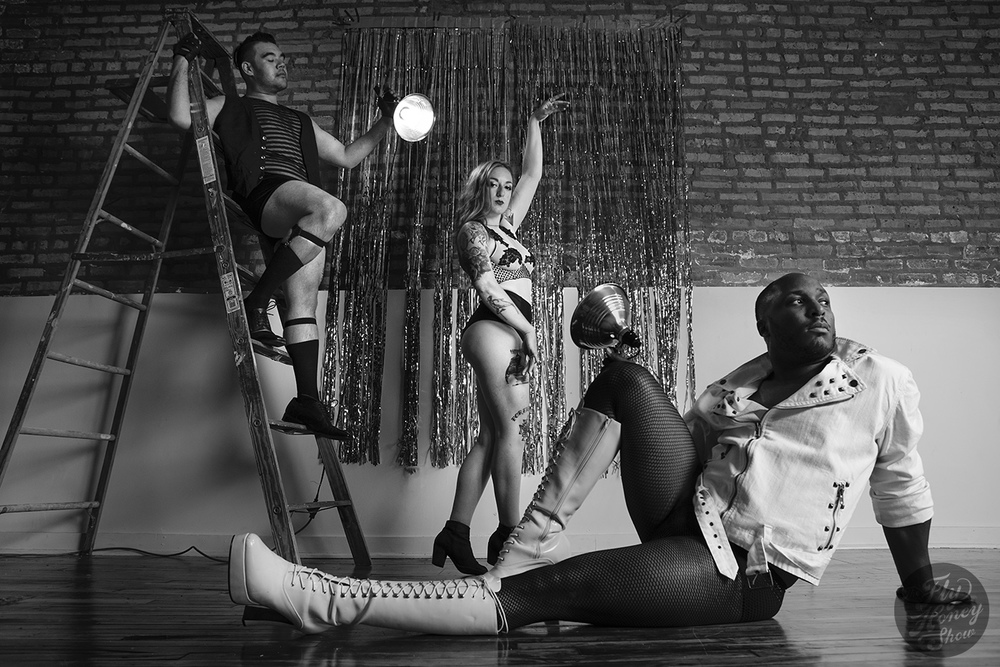
Bear with other Fly Honey cast members. Photo by Megan Lee Miller
How did you first get into theater? What spoke to you about it?
I grew up singing. I was a chorister at the Washington National Cathedral, starting at a young age. The prep school I attended was established specifically to serve the boys of the Cathedral choir. I happened to be from an underprivileged community, so the fact that I could sing helped me in that aspect. Once I got to high school, I kept singing. Everyone was like, “Do a musical!” So I started doing musicals and variety shows. Senior year, we did Les Miserables, and I was Javert. We were working on “Stars” one day, and my director made me sing it probably 10 or 12 times in a row. He kept saying, “You’re not doing it right!” I was like, “I don’t understand what you’re asking me to do!”
Afterwards, we had these theater awards called Cappies, and just about everyone in my production was nominated, but I was not. Since I’m such a contrary person, I decided I was going to continue acting in order to prove to everyone that I can do this. No one is going to tell me I’m not good enough. I literally decided that it would be the most difficult thing for me to do and went for it.
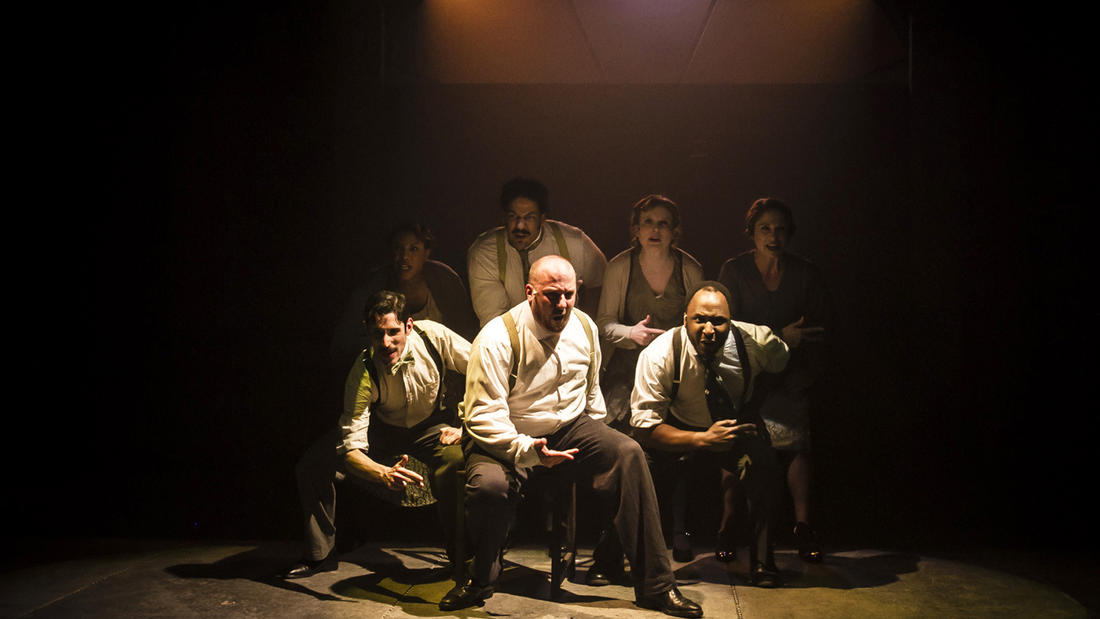
Bear in Adding Machine. Photo by Matthew Gregory Hollis
Is there one person you would note as an inspiration on your career path?
I don’t know about just one…I would say, obviously, my parents. I am very lucky that they were 100% supportive. In college, I had a professor named Patrick Sims. He was the Black theater professor at UW Madison. Patrick took an interest in me and pushed me to do better. I still remember, in our Acting III class, we had a final where everyone picked their own scene and performed it. My partner and I chose this great scene, and we set it all up so it felt like we were in a train car. Tore the scene up! The whole room was silent. Everyone was shocked. Another couple came on after us and did a scene, and one of the people called “Line!” in the middle. They had chosen their own scene, so no one had a copy or any way of feeding them their line. In any sort of final presentation or production, you don’t call “line,” you work your way through it!
Grades come back a week or so later, and we found out that they got an A and we got an A-. I went up to Patrick, and I was like, “Patrick, what is this?” His response was, “Bear, they worked their butt off for that. I know that they did the best that they could possibly do at this time. I still think you can do so much more.” I was like, “I really appreciate that, but grades still matter for all of my scholarships and everything, sooo…” [Laughs]
You’ve found a pretty amazing space as a part of one my favorite productions to hit Chicago every summer, The Fly Honey Show.
Yes!
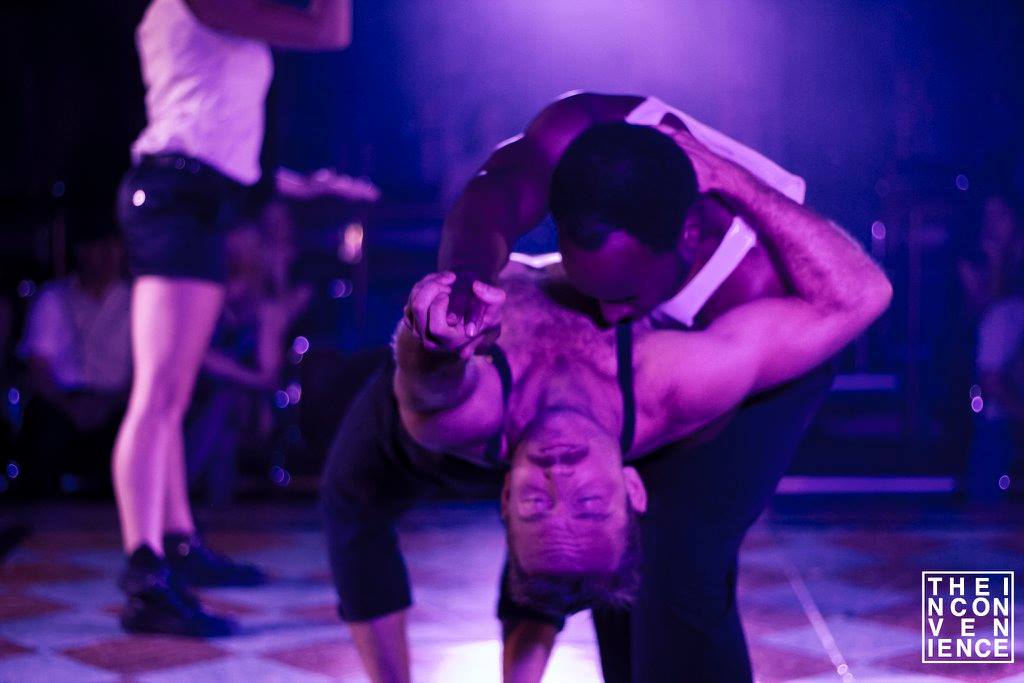
Bear performing in last year’s Fly Honey Show. Photo by Matthew Gregory Hollis
How did you become involved in the Fly Honeys, and what has their message of empowerment and body-positive celebration done for you?
I was working at Revolution Brewing Company when Erin Kilmurray, curator and director of The Fly Honey Show, was hired. We went out after work one night and were dancing. She kept insisting I had to do Fly Honey, but I had no idea what it was. That year, I went to the show. The performance finished, and Erin came up to me. Before she could say anything, I cut her off and told her she was stuck with me. I started doing it the next year, and this is my third year now. I’m a Fly Honey company member, which means I’m available to be used in multiple pieces.
Fly Honey Show is a space that, first and foremost, is about empowering women. It’s sexy, it’s fun, and it’s beautiful. It’s a huge party, but it also has a really important and dope message that comes across. The way that message comes across and the party that is involved is something I was really drawn to.
As a woman, it was such an empowering experience for me to see various genders involved in the show. It made me realize that women are not the only ones fighting for this message of body positivity and love to come across. It made me feel less alone.
Definitely. You have men getting up on that stage and taking off their clothes who aren’t necessarily “in shape.” I mean, there are some who are and some who aren’t. There are men who aren’t dancers at all getting the chance to express themselves in a way that’s normally associated with and allowed to be a female expression. I think that, in itself, is really powerful for a lot of the men that come back and do it every year. Also for desensitizing the gender binary that is so prominent in our society. Like, “this has to be what men do and this has to be what women do.” No, that’s not the way this should work.
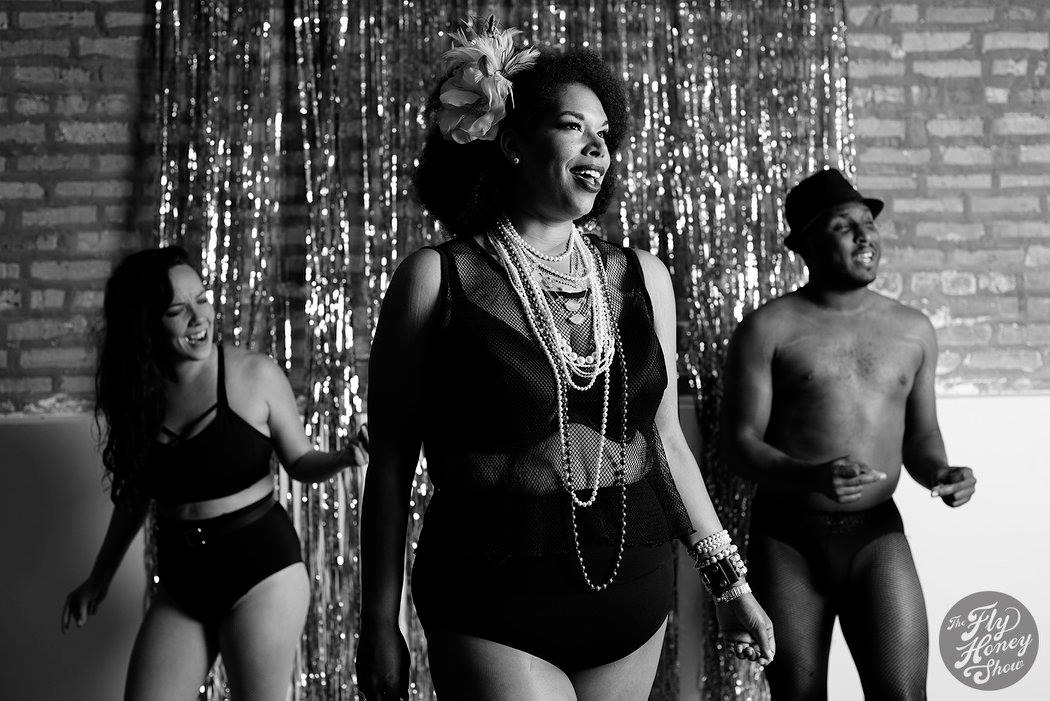
Bear and other Fly Honey 7 cast members. Photo by Megan Lee Miller
You’ve been very vocal about your experience as a blacktor and standing up against racial inequality within the theater community. What led you to this strong activist role?
When I was in college, we did a production of Urinetown one year, and a guest director came in. I learned from someone that during auditions, before anyone came in the room, she said she could not see a Black person as a lead in this show. Now, we only did a musical every two years there. There wasn’t a musical theater program, just a regular theater program, so there weren’t a lot of great singers. I knew I was one of the few people that could hit every note in that show. It would be natural that I would have the opportunity to at least audition for a lead role. Didn’t even get a chance to do a scene, nothing. Three of us in the show were Black, and we were all just about one part over from where it made sense for us to be, based on our vocal types. We all thought she mixed us up, but there’s no way to really know that. We go into rehearsals, and I’m playing this part that’s like a sidekick. I go into a voice lesson that we had to do, not a singing lesson but a talking one, and the vocal coach was like, “Well, I think…you…should…talk…like…this…,” imitating a very slow, uneducated-sounding drawl. I refused to do that. That is a racial stereotype. Turns out it was a note coming from the director. I went to talk to her, and as soon as we start getting in this discussion, she gets on the uber-defensive, saying things like, “I don’t see color,” and, “I’ve never seen the stereotype of a lazy Black sidekick.” I was like, “Really? I can list them off right now!” We ended up meeting with the head of the department. Because she was a big shot guest director, instead of addressing the issue, they just accused me of being lazy. The director didn’t talk to me for the next two weeks. I came up with a whole new character on my own, which worked out, but it was a very miserable experience. That was one of the first times where I noticed everything around me was wrong. I did also have an actor call me “Nigger” in a production.
Wait. Excuse me, what? This happened, like, during the show?
It was during our first technical rehearsal. Lights are going. Music starts. We all run on stage. We’re all riled up. We’re supposed to be talking to the women across the stage, just being guys, you know? This actor, like, two guys over, yelled “Nigger!” right before the scene ended. I was like, “Did someone just…improv the…no way! I must be making that up!” Later, another actor came up to me and said he had heard it, too. I was just so confused. How does this happen? I had a meeting with the director and…there’s this thing abut being an actor and feeling this way. I would say it’s similar to women in business a lot of time. You don’t want to be “the difficult one” because that won’t get you any further. The actor apologized, but you shouldn’t be able to use that kind of language and keep your job. Nothing happened to him. He stayed in the exact same dressing room, right next to me, the entire time. That, again, turned into a very miserable experience.
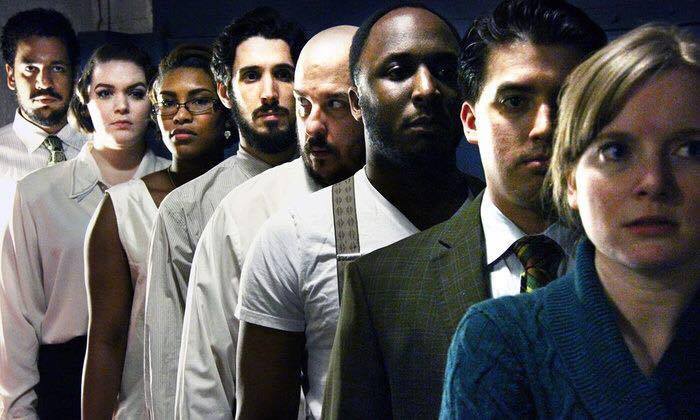
Bear and the cast of Adding Machine
At this point, you’ve been acting in various theater companies for some time and dealing with the same issues over and over again. What do you think could help create a better, safer environment?
First and foremost, one of the things I noticed the second that happened was that the only other Black person in that room was another actor on stage. The room was completely full, yet there was almost no one in the room that could understand how impactful that word is.
I think a lot of theaters grow out of this mentality of “I want to start something with you because you’re my friend. I like you, and you know what I do, and I know what you do,” but friend groups coming out of college and then existing in a large city tend to be incredibly segregated. This means that minorities don’t get the same opportunities.
Theaters love to promote that they have two shows featuring minority artists this season! But how many people of color are in any level of control at your theater? How many directors, artistic directors, casting directors…how many people of color are on your administration team? How many women? It is definitely a white man’s show. It becomes very frustrating, and the first step it to actually try and get diversity in that room, so when decisions are being made and things are being talked about, somebody in that room has that perspective.
In addition to speaking out within the theater community, you’re very active in the Black Lives Matter movement. As an activist involved in this important movement, what do you think society needs to do to stop failing black men and women?
There are so many different angles and tactics. There is the immediate problem of police brutality. As someone that is slightly more radical than your general left, starting for me, there needs to be a drastic overhaul of what policing means in the United States. Why are police walking out every day with guns? Why? I believe the job should be to try to alleviate the situation, and if you can’t, you should be able to call someone in that has a weapon. You don’t need to be walking the streets with a gun every day. It’s unnecessary, and it then becomes an instinct to reach for it. That instinct is influenced by too many outside factors that aren’t just the interaction you’re having. It’s influenced by crime statistics swayed by laws that have taken inner cities and made them into spaces that are just shipping people to prison. It just so happens that all of those people tend to look like me.
When I start thinking about how those things intersect, I start thinking, how do we break down this entire system? What do we actually need from police? How many things that we call the police for are situations where we need an armed presence? Like, my car got stolen! Do I really need someone with a gun coming to take my report? No! If you are seeing someone being beaten on the street, then someone with some sort of weaponry may be necessary. It could be a taser. It could be gas. In my personal, far-out point of view, even then, I’d rather not call the police. I’d rather have a community of people who are empowered and trained to take care of it themselves. If there’s a fight going on, we could come together and knock on a couple of doors. Everyone comes out and says, “Stop. This is done. We’re done with this.” As opposed to the idea that this happens and you have to be incarcerated. You have to have more violence enacted upon your body. I’d rather we try and figure out a peaceful, community-based way to handle the situation.
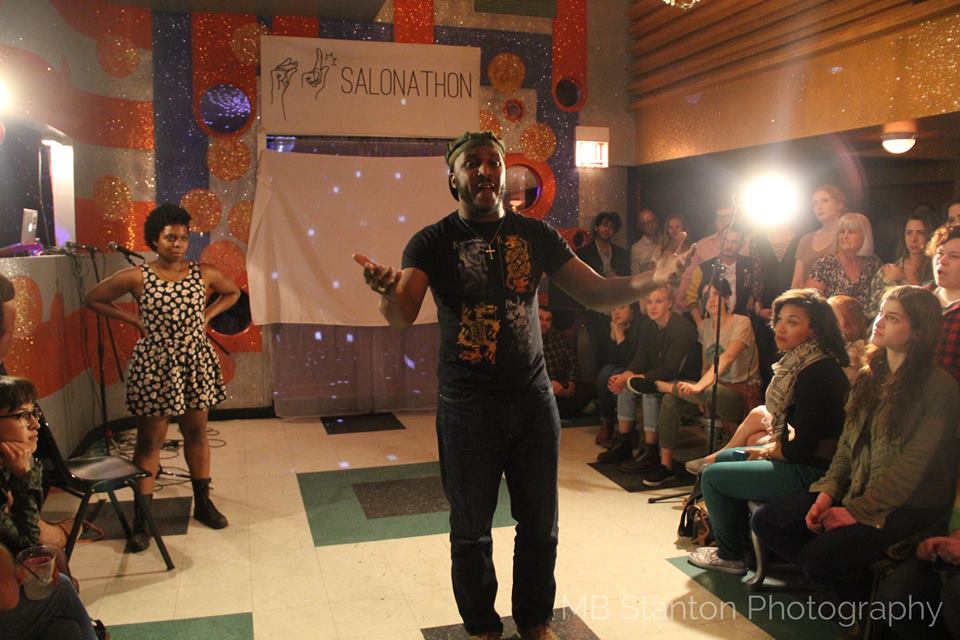
Bear performing at Salonathon
You describe your perspective as “far-out,” which makes me think you’ve had a lot of people tell you that. What do you say to those who disagree with you?
I was talking about this last night with an Uber driver actually! [Laughs] I was talking about globalization and the world getting smaller. We no longer have to interact with and live around people we don’t agree with. There’s no exchange of ideas. There are all these different, thriving communities, but they never connect. We don’t understand each other’s troubles. I love all of these artists in Chicago, but watching them be like, “I totally understand what’s going on within the Black community right now. I’m so sorry.” When was the last time they interacted with a Black person who wasn’t already their friend? You end up with people who truly believe they are understanding, but because they don’t spend any time experiencing, they can’t get a closer look at what true understanding means.
This Uber driver last night was talking about how he is conservative and doesn’t believe in gay marriage. His niece told him he was hater. In the back of my head I was like, “Yeah, I totally agree with that.” But in the conversation, I was like, “Okay, you don’t have to agree with gay marriage, as long as your beliefs don’t encroach on someone else’s ability to live their life.” I think we should be able to disagree, as long as my rights don’t interfere with your rights.
Black Lives Matter has drawn so much attention, and it seems like so many people outside of the community want to be allies, to help fight and be a part of the change. What advice do you have for allies of the Black Lives Matter movement?
Get involved with the community. Meet more Black people. The simple first step is actually finding out about the experience. Everyone is so gung-ho about the movement, especially young liberal millennials. Start by learning the depth of what being a part of that community would mean, what a role in that community would mean, and all of the violence that happens. Experience what people mean when they talk about “black-on-black crime.” Be in that neighborhood and see how that works. Know the system of control that keeps people involved in said “Black-on-Black crime.” Seeing and understanding that firsthand is so important. Actually getting out and supporting is so important. I understand that not everyone can be out in the streets protesting. For me, there are days when I can’t be out there. As a person who wants to be out there every day, I haven’t been able to be out for the last two protests because of work. I have to pay my bills. But that’s not the only step. That resentment, that anger, that hurt is something that can be used for more. The focus right now is: what IS more? It isn’t just retweeting the video of another black man getting shot or saying, “Black Lives Matter” or going to one protest. It is what happens past that. What are you looking into in terms of your local laws that are allowing your police to get away with these crimes? What are all of the smaller actions that come together to create this big, corrupt system, and how do we address those?
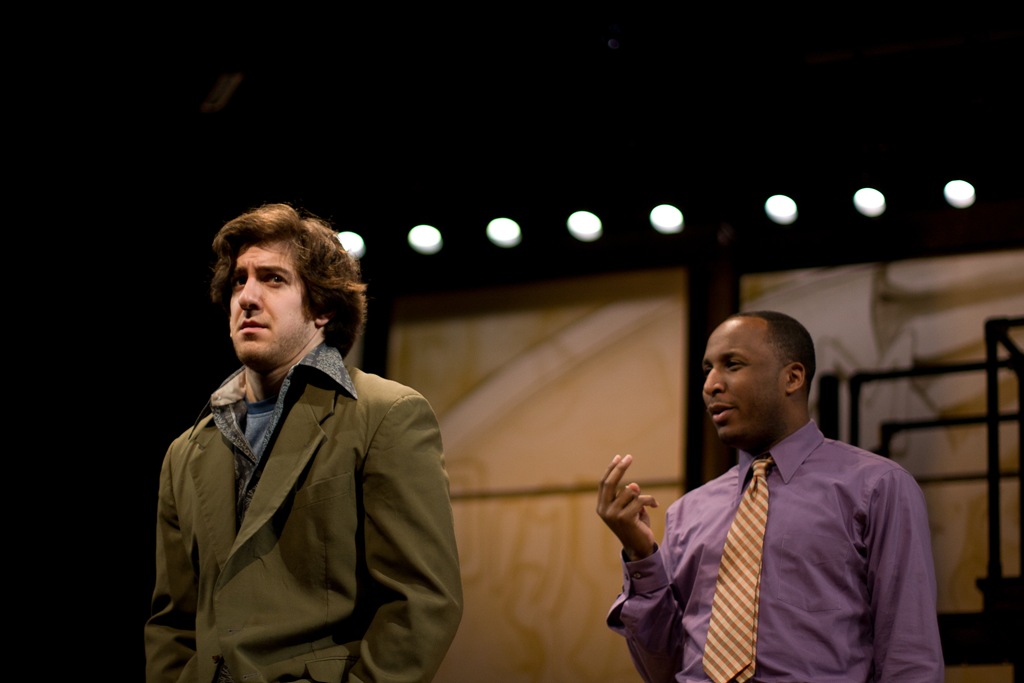
Bear and Adrian Aguilar performing tick, tick…BOOM! at Porchlight Theatre
There are so many intense aspects of your life. What do you do to decompress and stay sane?
I still keep in touch with two of my very best friends from second grade. They are family to me. I refer to them as my brothers all the time, which annoys my sister. I have an ongoing chat with them, as well as one of my black professors from college and another friend from college. There are five of us in the chat—five Black men—and we just say all the dumbest things we don’t want to say regularly. We can be 100% ourselves and realize that, if you say something stupid, you’re going to get called on it. But also, you’re allowed to say something stupid. You’re allowed to trip over yourself. You’re allowed to not worry about anything happening in the outside world within that chat. That’s one of the ways I keep my sanity. That and just watching stupid shit on Netflix.
I have this horrible habit of waking up, checking my email, and then immediately going on Facebook. I scroll down and open article after article and video after video. I have a backlog of things I need to read right now. People always tell me not to do that right when I wake up or right before bed. But I try not to insulate myself from what’s going on around me.
One of the things I keep meaning to write about is this experience with the police on my 30th birthday. A friend of mine, a black woman, had her purse stolen while we were out. When we went to the police station, we were treated with absolute disrespect and threatened with arrest for demanding answers. I wrote about it on Facebook and, in the post, I put at the bottom, “I know this isn’t very important or impactful.” People immediately responded assuring me that it was. Obviously that experience was impactful to my life…but in the grand scheme of things, I dealt with that [type of harassment] one day this year, and a couple of times out and about, and a year ago when the cops came and raided my house for no reason. People in some communities experience that every single day of their lives, multiple times a day. So when I say it’s not that important, I don’t mean it’s not important to see that this exists. I mean that in the grand scheme of things, I am on a very privileged end of this terrible spectrum. I only have to deal with it once in a while.
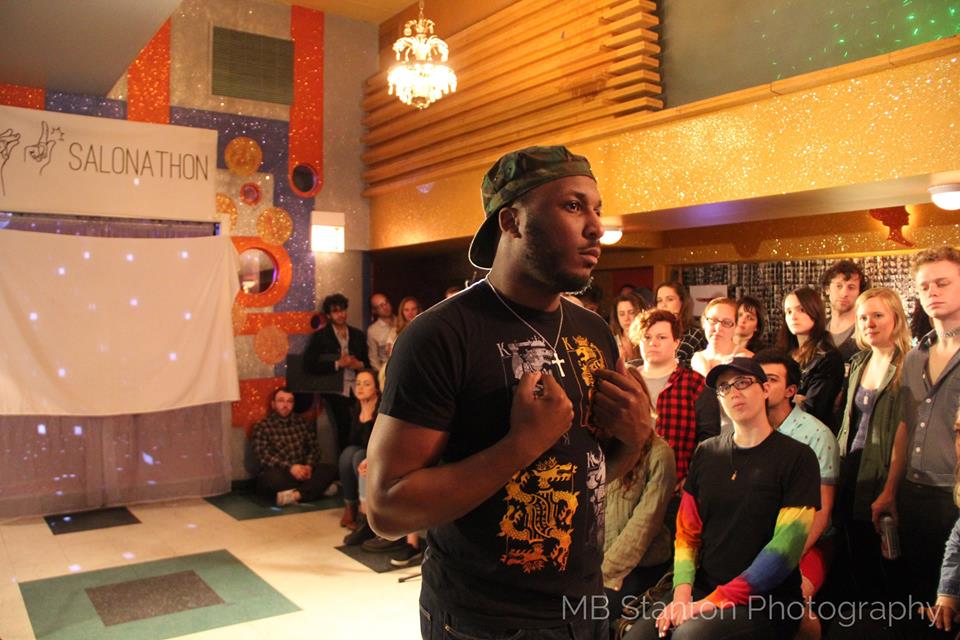
Bear performing at Salonathon
Do you consider yourself successful, and what does success mean to you?
Something I keep asking myself is, “I just hit thirty, what does this mean? Where am I?” Economically, I am definitely in the worst shape I’ve been in since I got out of college. In the last two and a half years, I’ve left two jobs for racial discrimination. What does that mean when my money is affected by that?
When you look at it in terms of classic success, no, not at all! I’m a mess. On the opposite side, on my 30th birthday, I had so many people reach out to me, thanking me for my writing and the work that I’m doing. Many people were telling me the positive ways that I’ve affected their lives–not only friends of mine, but people I haven’t talked to in years. Maybe that is a measure of success…taking steps to make at least my little community better.
I’ve always said my goal in acting was to never get famous. I want to be able to make a living acting, but I don’t want to be a face that people are looking at all the time. The reason I do this is because I think it’s important to see minorities on stage. There is something very important in the majority having to look at someone who is different than themselves and identify with their perspective, whether it’s Black, Hispanic, Native American, Asian, queer, or female. That’s why I do this: to try and make a difference.
You can follow Bear on via Twitter and read his writings over at Medium. His piece “I’m a Black Actor. Here’s How Inequality Works When You’re Not Famous” is available to read on VOX. The Fly Honey Show is on stage at the Chopin Theater for its final weekend, from September 1st to September 3rd.
Feature photo by Megan Lee Miller

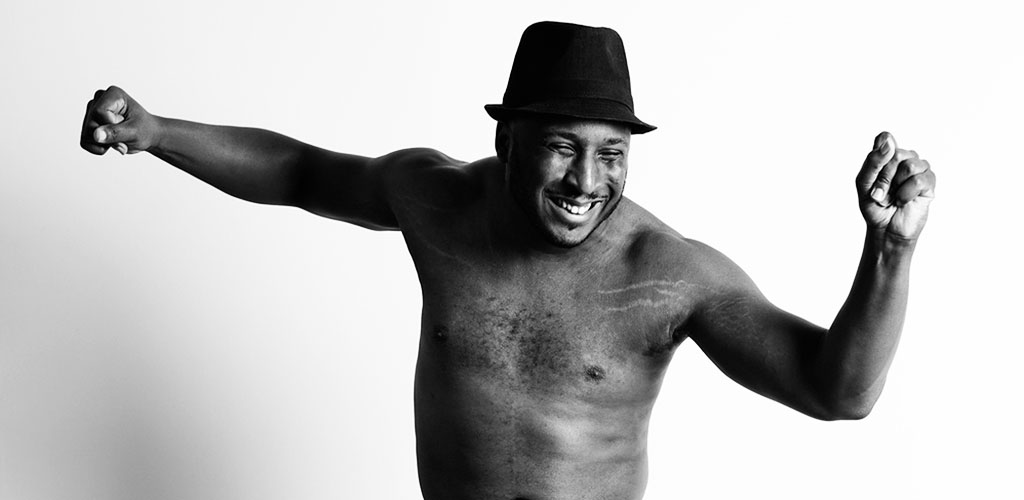
Review: The Wolf at the End of the Block (Teatro Vista) | Chicago Theater Beat
Posted at 04:22h, 27 February[…] then moves to an alley behind the convenience store where Abe works. Store owner Nunley (Bear Bellinger) and Abe’s sister Miranda (Ayssette Muñoz) are in a rapid-fire back-and-forth about Abe’s […]